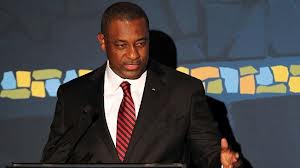By Andrew Warshaw, Chief Correspondent
March 4 – FIFA’s new anti-racism chief says tougher penalties need to be introduced to help eradicate abuse and wants to meet with both the perpetrators and victims. FIFA vice-president Jeffrey Webb, who runs the CONCACAF confederation that covers north and central America and the Caribbean, believes black players have been let down by football’s authorities and is determined to do something about it.
FIFA is becoming increasingly worried about the growing number of racial abuse cases among players and fans, not least in eastern and western Europe, and Webb has been drafted in to head a new Anti-Racism Taskforce, likely to comprise at least half a dozen officials, to try and tackle the problem head-on.
The new body, whose composition has yet to be established, was recently approved by FIFA’s strategy committee but FIFA president Sepp Blatter took his advisors and the media by surprise on Saturday with an impromptu public announcement of Webb’s previously unreported appointment – before it had been rubber stamped by FIFA’s own executive committee later this month.
Blatter revealed the new body’s existence on the steps of the Balmoral hotel in Edinburgh ahead of the annual International FA Board meeting. FIFA’s media department rushed out a statement confirming the news and 24 hours later, Webb, who was also in Edinburgh as part of the FIFA delegation at IFAB, sat down with journalists to elaborate on his appointment.
Webb, from the Cayman Islands, took over the running of CONCAFAF last year from Jack Warner and is moving impressively up the FIFA hierarchy as one of its most talented, thoughtful and approachable reformers. He is also deputy chairman of FIFA’s Audit and Compliance Committee and although the terms of reference of his latest role have not yet been ironed out, he was keen to stress how badly racism was affecting the game.
“We’ve been talking for a long time in football [about racism] and I don’t really think that we’ve supported the players,” Webb said. “I don’t think we’ve necessarily put the right sanctions in place to support them. It’s a travesty that it comes to that.”
FIFA and UEFA have got tougher in recent weeks by ordering countries and clubs to play games behind closed doors and Webb clearly believes this is the way forward rather than imposing fines.
“I really don’t think that financial instruments in today’s world are enough to deal with it. The fines that are being established, I don’t think they’re working, obviously. If there are consecutive infringements then I think we have to be strong and say these are the steps that are taken – just like in society. We have laws throughout society. We know if we break the law what’s going to happen. There are certain punishments and I think, for us in football, we need to adopt the same mentality.”
Blatter has previously said points deductions and relegation are the kind of punishments that might needed and Webb agrees. The heaviest bans for racist abuse by players have come in England where Liverpool striker Luis Suarez served an eight-match ban for racially abusing Manchester United’s Patrice Evra and Chelsea captain John Terry was suspended for four games after insulting at Anton Ferdinand of Queens Park Rangers. This season, AC Milan midfielder Kevin-Prince Boateng led his teammates off the pitch when he was racially abused during a friendly against Italian fourth-tier side Pro Patria in January.
Task forces and new committees have long been viewed by the cynics as FIFA promising to tackle pressing moral issues, only to indulge in talk shops that don’t actually produce concrete results. Webb wants his body to have real teeth and plans to make a fact-finding trip to England one of his first priorities, talking to those found guilty of meting out abuse – and those on the receiving end.
“I will be meeting with the FA chairman David Bernstein and visiting the FA,” Webb said. “At that time I would also like to meet with some of the players, perhaps have a round-table discussion to talk to the players and get their input, get some suggestions from them and learn from what their experiences are. There’s a number of players who have been victimized, targeted. We would like to hear both sides really.”
“The FA have been very aggressive in their campaign. I think if these incidents do exist in an environment such as the Premier League then it begs the question what happens in some other leagues where they don’t have the resources and the will.”
Bernstein is pleased to be meeting Webb in London some time in the weeks following FIFA’s March 21 executive committee meeting. “It is vitally important football’s governing bodies share experiences and knowledge if we are to properly tackle this issue,” said Bernstein.
Webb has concerns about the lack of opportunities for black players in higher levels of the game. “Some players … might want to go into management. Do they really have that opportunity? We as a football family, overall, have to sit down and take a look in the mirror. What happens to the players after they finish playing? Do they really have a chance at being a professional manager? Do people of colour really have a chance to become executive directors of various clubs and boards?”
Webb’s new Taskforce plans to present an action plan to the FIFA Congress in Mauritius in May. “What I hope to bring to it is two parts. The first part is dealing with the sanctions. But, also, it’s an educational process, engaging the players, engaging some non governmental organizations (NGOs) and also the football fans and the clubs. Why this (racism) has been happening I’m not sure but we’ve got to get to the root of the problem.”
Contact the writer of this story at moc.l1745611013labto1745611013ofdlr1745611013owedi1745611013sni@w1745611013ahsra1745611013w.wer1745611013dna1745611013

